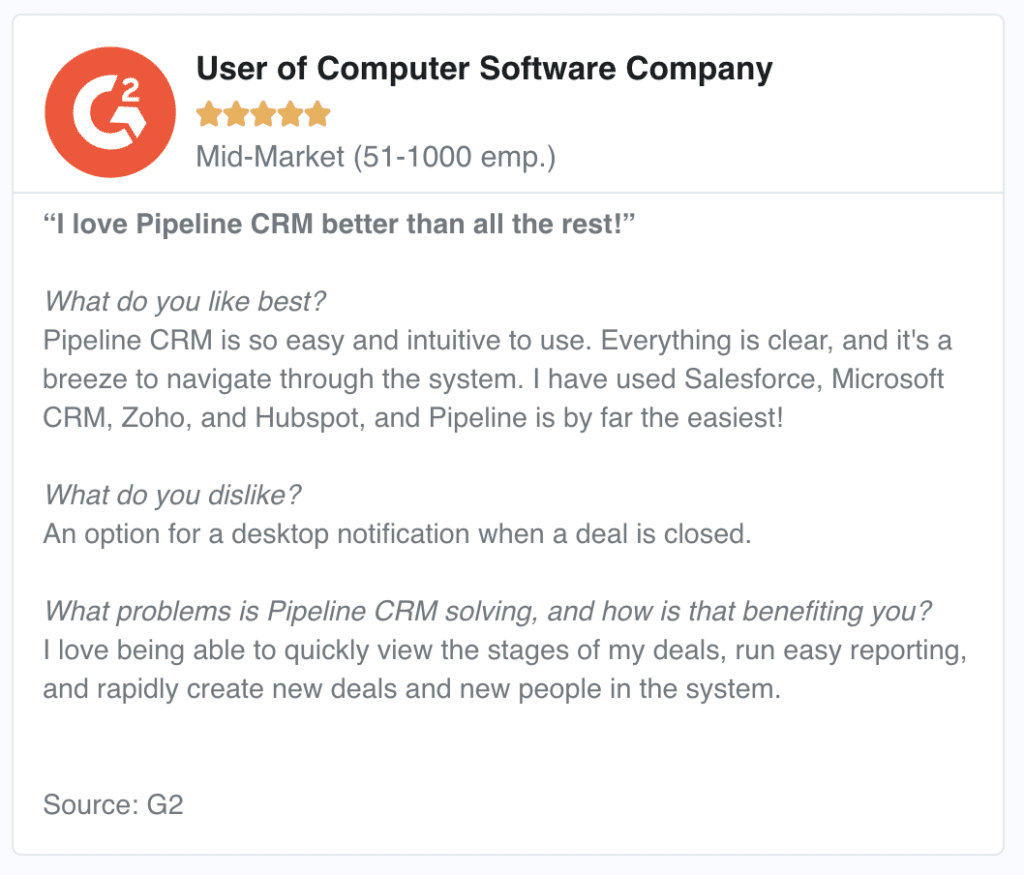Discussing competitors is a part of selling. Follow these 5 sales tips to turn them into opportunities to highlight your business’s unique selling points.
In a sales meeting, it is often difficult to avoid mentioning your competitors. After all, the sales calls aim to inform your leads about what your product can do and how it differentiates from others.
At some point in the conversation, you will mention your competitors, make comparisons, and even put your brand above them to win the prospect’s trust. If you aren’t careful, this move can make you look unprofessional and decrease your chances of sealing the deal.
So, how do you properly mention your competitors in a sales call?
We’ve gathered some tips, practical phrases, and examples to help you confidently discuss your competitors without causing unwanted effects.
Why Talking About Your Competitors Can Backfire?
In today’s business landscape, impression matters.
According to a LinkedIn report, 43% of the respondents say they will likely select a sales professional’s company as a vendor if they have a favorable impression when meeting with the sales reps.
This means more than half of your prospects may turn you down when they feel uncomfortable communicating with you. Of course, many factors can cause this, including when discussing your brand against the competitors.
The impact of this situation isn’t only resulting in futile sales but also can negatively affect your brand reputation and position—and you don’t want that.
5 Sales Tips to Skillfully Mention Your Competitors in Sales Meetings
Whether you’re just beginning to navigate discussions about your competitors or want to revamp your current strategy, here are five etiquettes and some scenarios on how to mention your competition artfully.
Sales Tips #1: Understand Your Value Proposition and Your Competitor’s
To establish credibility with a potential customer, you need to understand your market well. And that means understanding your competition’s strengths and unique value proposition. Be prepared to answer ‘why prospects should choose you and not the competitors.’
Understanding your competitor’s value proposition is critical for several reasons. First, it establishes your expertise in the broader market, including your competitor’s offerings. Remember, it’s likely that your buyers didn’t start their journey speaking with you. They’ve probably researched and may have preexisting perspectives or experiences you’ll need to address.
More crucially, understanding your competitor’s value propositions will help you address why your solution is the best option for the buyer.
Sales reps are uniquely positioned to get beyond the marketing and explain how your solution is uniquely suited to solve your buyer’s problem. Instead of offering broad generalizations, value is created for buyers by giving them a nuanced understanding of the differences between your offerings.
We recommend having a cheat sheet of your product value proposition at your disposal whenever you have a sales meeting. The summarized information should cover some aspects of your product and brand, such as:
- Comparison of features: general and feature-by-feature comparison
- Pricing and costs: pricing structures, discounts, modular or add-on system
- Customer reviews and satisfaction: highlight the results of your existing customers
- Market reputation and standing: e.g., concern about having an animal testing process, vegan vs. non-vegan products
- Ease of implementation and support: e.g., is customer support included in the plan
- Differentiation and unique value proposition: e.g., what does your product have but your competitors don’t? What are your most popular products?
- Roadmap and future development: e.g., how often will the product get feature updates?
Related: Sales terms change dynamically and often cause misunderstandings between you and the prospects. Refer to our A-Z Glossary of Sales Terminology to ensure you speak the same language.
Sales Tips #2: Don’t Speak Ill of the Competition
Sales is a competitive business, and salespeople like to win. It can be very tempting to degrade your competitors to show how superior your product is. However, there are better strategies to take.
So, what should you do when prospects compare you head-to-head with competitors or even say they get a better deal?
Stay calm, refer back to facts, and cut personal opinions.
For instance, you’re selling Solution A—sales CRM software. On your third call with a lead, they negotiate on the price by saying Solution B (your competitor) can offer 10% off your proposed price.
You can first check whether the information given by the lead is correct by checking Solution B websites. Sometimes, prospects like to bluff, and double-checking their argument won’t hurt.
If this is true, you can counter the offer by adding extra services, such as free onboarding, or mention why they’ll still get a better deal even though they pay you higher.
For example, talk about your unique features they can’t find in Solution B (e.g., built-in AI email assistant), show some customer success stories to help them see the capabilities of your product (like how this small business could increase their sales by 20%), or show some social proof, as explained in the next section.
Here is an idea of how to respond to a prospect:
Solution B is a great product. After all, they are the pioneers in the sales CRM software niche. However, we’ve put effort into creating a user-friendly sales tool without the fluff.
We may not be able to match the price at the moment, but you’ll get the following sales basic features that aren’t included in the Solution B package. When you calculate everything, you can see that Solution A is more cost-friendly.”
Sales Tips #3: Use Social Proof to Let Others Speak for You
One of the best parts of today’s sales environment is that there are a lot of independent analysis and review platforms.
If you’re in the B2B software environment, sites like G2Crowd, Capterra, and GetApp do a great job of curating reviews from real customers. If you’re a contractor, sites like Angi, Houzz, and ContractorTalk help magnify your customer’s voices.
These review sites tell leads how you differ from your competitors from a user’s perspective. Some information they can get is:
- What do you like best about [Product Name]?
- What do you dislike about [Product Name]?
- What problems is [Product Name] solving, and how is that benefiting you?
Collecting reviews takes time, but the reward is extremely valuable. This is because real customers or clients write all the reviews. They’ve talked with you, used your products/services, and essentially become your brand’s ambassadors. The reviews are genuine, and prospects can easily connect to them. Using this tool when doing a side-by-side competitor comparison is, therefore, highly recommended.
Furthermore, social proof lets the customers do the talking. This includes the good, the bad, and why the reviewer ditched the product (and switched to another product).
For example, in the review screenshot below, you can see why our users prefer Pipeline CRM over other sales CRM software. Showing this social proof to prospects hugely supports your argument, and technically, you’re not the one who mentions the negative aspects of other brands but the reviews.

Source: Pipeline CRM’s G2 Reviews
Related: See how Pipeline CRM stands against other big-name sales CRM software in these comparison pages. We break down the pricing, features, industry expertise, and more.
Here’s how to respond to competitor comparison:
Glad that you mention Solution B. Many of our customers are ex-users of them—but, ever since they used Solution A, they’ve never looked back. After the call, I will send you some customer reviews and success stories to share what they say.”
Sales Tips #4: Focus On Helping Your Prospect Make Better Decisions
Building a trusted relationship with a buyer is more important than beating a competitor at any cost. This means your goal is to help your buyer make an educated decision. Because, at the end, educated buyers become long-term, happy customers.
For example, you are in the painting business and charge more than the market price—how can you educate your leads on what makes you different from the competitors? Are you more expensive because you use better paint, or do you offer a price-back guarantee?
One great way to address this is with your marketing department. Work with your team to help address common points of differentiation between you and your competitors.
Sales Tips #5: Follow, Prepare, and Get Ready
You’re eventually going to be asked about your competitors. Take time to prepare what you would say about your competitors. Have a list of answers that consider buyers’s particular needs.
And it’s also important to keep up with the latest news about your competitors. A few best practices for following your competitors include:
- Subscribe to Google Alerts so that you’re emailed about news stories
- Follow your competitors on social activities and watch their company pages (LinkedIn, Facebook, Yelp—wherever they’re most active)
- Follow their review pages on G2, Capterra, TrustPilot, Google Reviews, etc.
- Share knowledge and tidbits amongst your fellow salespeople in a Google Doc, or have your marketing team put together some talking points
Don’t be caught flat-footed. Prepare for what you will say about your competitors to stay in control of the conversation with prospects.
Capture the Data You Need With a Smart Sales CRM
In a sales call, comparing one brand to another is often unavoidable. After all, that’s how prospects decide which product suits their needs best.
When confronted with this situation, stay professional. Bad-mouthing other brands isn’t the way to persuade leads to choose your product. On the contrary, they may see this as a negative behavior and decide not to proceed with your proposal.
The best way is by promoting your brand. Social proof (product reviews), customer testimonials, and your brand’s unique selling points are three handy sales tools to convince your argument with real-life examples.
Build your library of sales materials in a sales CRM solution and share them with your colleagues. Ask other departments, such as marketing, product development, and customer services, to work together to create a powerful sales pitch that puts your brand above the competitors.
Leverage the seamless sales team management and data sharing of Pipeline CRM. You can assign and monitor team tasks from your dashboard, share files without boundaries, and save sales-related files in your unlimited storage.




